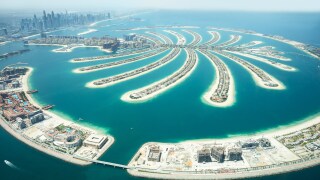Cities such as Abu Dhabi, Dubai and Riyadh – as well as Saudi Arabia’s NEOM mega-project – are predicted to experience the fastest growing M2M application growth at more than 40% to 2023, according to data released by Cisco.
“The Internet of Things is driven by M2M connections. In the Middle East and Africa region, smart cities will be the fastest growing vertical/application M2M segment, with a compound annual growth rate of more than 40% over the forecast period,” said Thomas Barnett, director of service provider marketing at Cisco.
However, a concentration of progress means vast swathes of the MEA region have historically received less investment, muting average regional growth rates; and the issue isn’t confined to M2M connections. For example, internet adoption in Saudi Arabia as a percentage of the population is expected to reach 76% by 2023, yet when calculated regionally the rate drops to 35%, the lowest of all regions globally.
Regardless of such disparities, the Middle East and Africa is still expected to have the fastest overall M2M growth of any global region at 24% CAGR, compared to a 19% average at the global level.
“The MEA is definitely a mix of some affluent economies, such as the UAE and Saudi Arabia, and some countries with developing economies and network infrastructures,” he said.
“The M2M growth might not be reflected across all countries in the region, but overall, the Middle East and Africa will have the fastest M2M growth at nearly three-fold, compared to a 19% CAGR (2.4-fold) at the global level,” Barnett added.
Cisco’s insight also found that the share of global M2M connections will grow from 33% in 2018 to 50% by 2023, when there will be 14.7 billion M2M connections, up from around 8.9 billion currently.
Today, Dubai and Riyadh are considered among the top smart cities of the world, with others, such as Nairobi, also gaining recognition.
In fact, the JLL City Momentum Index, released in January, ranked Nairobi as the fourth “most dynamic city from a real estate perspective” among 130 other emerging global business hubs, followed by Dubai in 15th place and Riyadh in 18th.
The MEA region’s M2M adoption and smart city development will feature on the agenda at Capacity Middle East 2020, taking place next week in Dubai.





